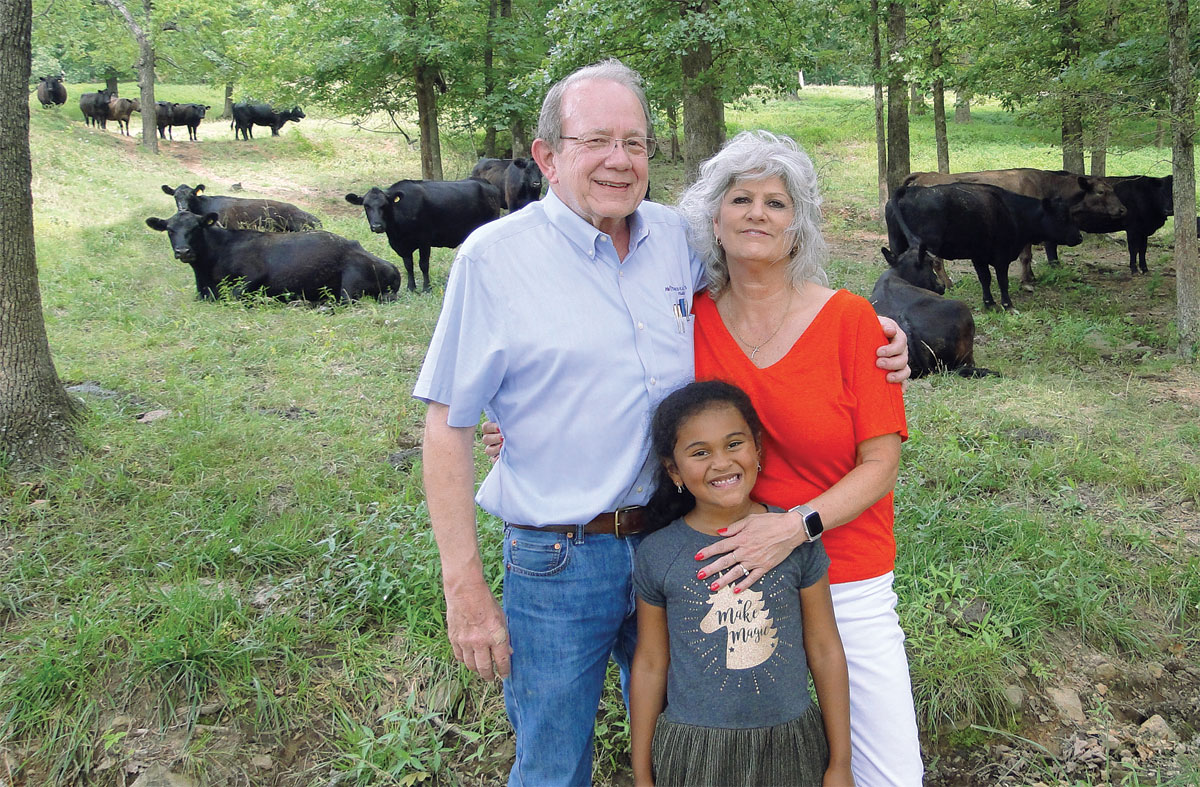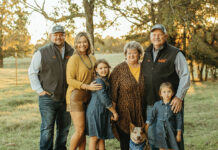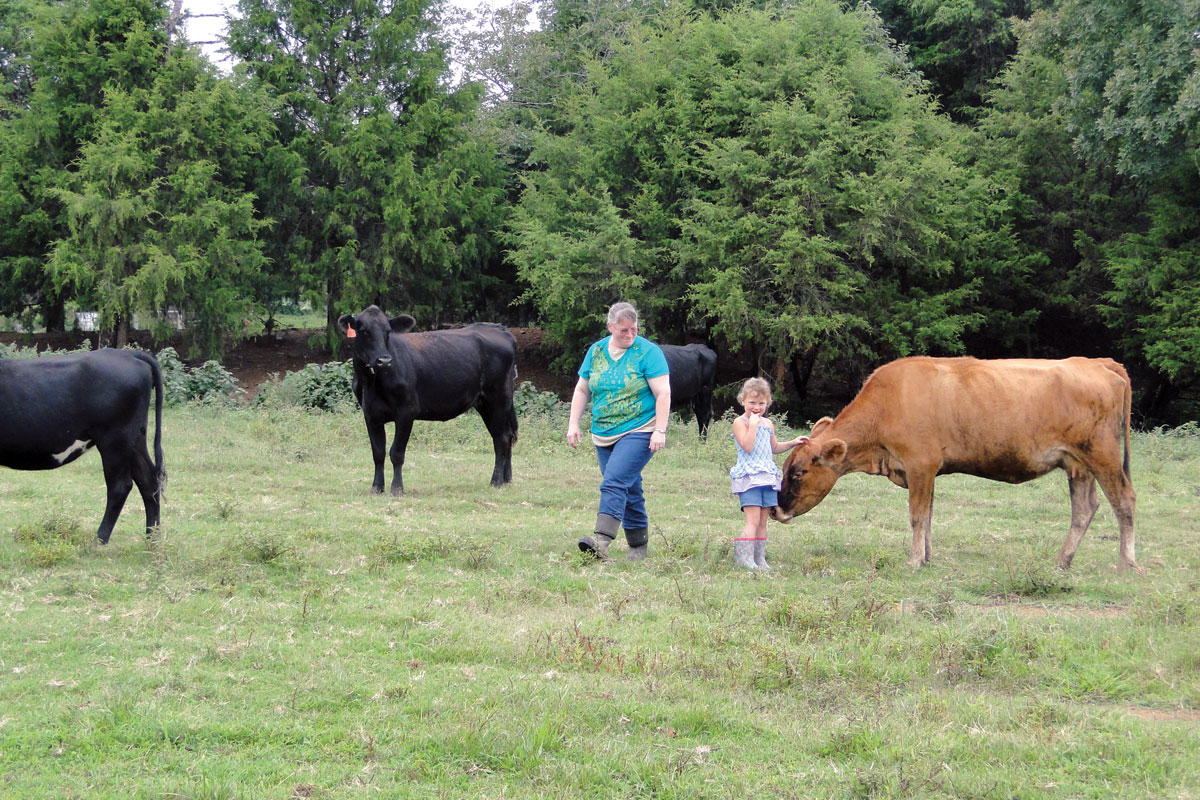
Phillip Rozell’s father pushed for an education before starting a farming operation
Some cattlemen pursue a professional career until investment money is available to join the ranks. Phillip Rozell of West Fork, Ark., entered pharmacy school and found the curriculum difficult. He approached his father, A.A., and said he would rather go into agriculture. His father explained that was fine but if Phillip wanted to do that, he did so without family help.
“I’m really glad my dad had me face reality and go back to school. In my mid 40s I could afford to begin what I couldn’t have afforded before. Starting from scratch in agriculture for a family income is tough. People like me have to work to pay for farming,” Phillip acknowledged.
Phillip’s uncle Jack had chickens and cattle, but the cows are what really spoke to young Phillip. He saw his first calf born while sitting in a pickup truck down by a river. Phillip also remembers moving cows 6 miles down the road to fresh pasture with the cows following the truck. Jack was a bit of a prankster, which also suited the youngster, most of the time. Phillip remembers them coming into the house with both of their heads covered in chicken feed and causing quite a stir with Phillip’s mother Christine. However, Phillip also remembers Jack embarrassing him when he fell into a cow patty.
Phillip’s wife Dana, a 25-year veteran in education and now assistant to the associate superintendent in Fayetteville, Ark., remembers Phillip winking at her from behind the pharmacy counter in a grocery store. Extremely unsettled, she stayed away from the store for a month. When she ventured back in a month, Phillip hurried up and apologized for scaring her off.
“I was not a fan when I met first met him. Now we share two daughters, two sons and seven grandchildren,” Dana explained.
Though extremely busy between her job, taking care of the house, spending every minute she possibly can with her grandbabies and checking in on her aging mother, Dana helps Phillip whenever he needs it.
“He was a pharmacist when I met him, and I didn’t see this coming,” Dana said with a good-natured smile.
In 2002, the couple bought 150 acres of overgrown pasture in West Fork, Ark., and also lease another 150 acres. After fencing off a small pasture for a dozen heard of cattle they brought land reclamation took two years of extensive dozing and clearing with the land seeded in 2004. Though they started out with all registered cattle, they now have 75 cows that are 90 percent Angus and are bred by five registered Angus bulls, with new bulls from local and familiar breeders. Bulls are culled after serving two or three years, and new ones fully vetted before being added to one of their three groups of breeding females.
Because their professional lives are so busy, Phillip finds having one calving season, beginning in March, most efficient. All were born within 45 days last year. Calves are fence line weaned at 400 pounds, including six to eight replacement heifers which are not bred until they are 2 years old.
“After being in the chute once or twice, you know the animals’ temperaments, which is a big help in picking out retainment heifers,” Phillip said. “However, DNA testing of each one is a critical part of the selection process.”
Calves are retained until the following April when they are sold at 550 to 600 pounds. Phillip typically sells at the Benton County Sale Barn.
Phillip uses a 15 percent protein and 3.6 percent fat ration with extra calcium and growth additives, which his co-op supplies whenever he needs it. The University of Arkansas Cooperative Education Service and Johnny Gunsaulis provide technical information when needed to ensure appropriate herd nutrition.
One interesting aspect of the Rozell operation is a time saving, self-designed ration feeding system. A bulk bin is connected by a flexible auger that delivers feed to nearby bunks for cows and calves at various times. Delivery is controlled by a hand winch system next to the covered line of bunks and adjacent to an enclosed hay storage facility.
Because of time constraints and the high cost of equipment, Phillip buys his hay, usually 200 tons a year and most of it locally. Most big producers sell by the ton, and with Phillip purchasing so much, he is able to select the best quality hay.
Pastures are comprised of Kentucky 31 interseeded with clover to soften the impact of fescue, which subsides in June when the Bermuda takes over. Soil samples are taken at least once a year in spring and/or fall with AT Smith from Hinesville spreading a urea-based, time sensitive commercial blend fertilizer. Phillip broadcasts and spot sprays, especially for Johnsongrass. Pastures are divided into 12 paddocks with the herd rotated every three or four days after they regroup in July, which allows time for each paddock to recover before being grazed again.
One night when granddaughter Jazlyn was with them, the Rozells had to call a veterinarian in the middle of the night to help with a difficult birth. Of course, the grandparents planned on having Jazlyn back at the house before she could see anything unpleasant. However, the calf popped out and then had a uterine prolapse. Little Jazlyn was totally unfazed and because she was so busy cleaning up the new bottle baby, Violet, while the vet and Phillip worked for two hours on the cow.
“Violet thinks she’s a puppy and loves Jazlyn. She leans against any of us while she’s eating, unlike the rest who are still a bit wary,” commented Phillip.
Pharmacy school first really was the best choice for Philip because now he can do as he always dreamed without the burden of trying to support a young family.






